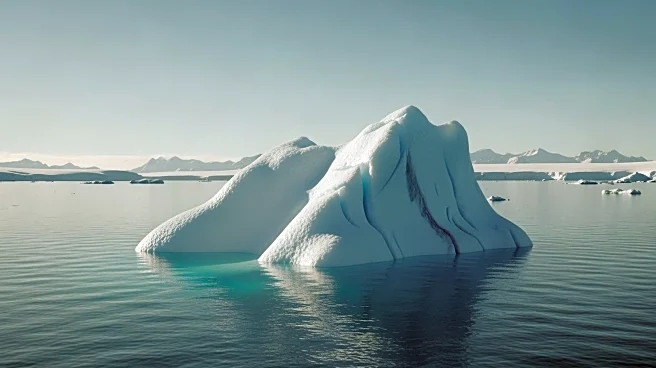What's Happening?
A study published in Nature Geoscience has uncovered that the East Antarctic Ice Sheet (EAIS) experienced significant retreat approximately 9,000 years ago due to a feedback loop between melting ice and
ocean currents. Led by Professor Yusuke Suganuma, the research indicates that warm deep water flowing into coastal East Antarctica caused ice shelves to collapse, accelerating inland ice loss. This phenomenon, known as 'cascading positive feedback,' suggests that ice retreat can spread across regions, amplifying loss on a continental scale. The study utilized marine sediment cores from Lützow-Holm Bay and geological surveys to reconstruct past environmental changes, revealing that warm Circumpolar Deep Water surged into the bay, leading to the collapse of ice shelves.
Why It's Important?
The findings highlight the potential for widespread ice loss in Antarctica due to interconnected oceanic feedbacks, which could contribute to global sea-level rise. The study provides crucial insights into the inherent instability of Antarctic ice sheets, both historically and in the context of modern climate change. Understanding these processes is vital for predicting future ice-sheet behavior and preparing for potential impacts on coastal communities worldwide. The research underscores the importance of international collaboration in climate science, involving over 30 institutions to enhance predictive models of ice-sheet dynamics.
What's Next?
The study's insights into cascading feedback mechanisms may inform future climate models and policy decisions regarding Antarctic ice-sheet management. Continued research and monitoring are essential to assess the ongoing impact of warm deep water on ice shelves and the potential for accelerated ice loss. Policymakers and scientists may need to consider strategies to mitigate the effects of rising sea levels on vulnerable coastal regions.
Beyond the Headlines
The study raises ethical and environmental considerations regarding the global response to climate change. It emphasizes the need for comprehensive international cooperation to address the challenges posed by ice-sheet instability and its implications for global sea-level rise. The research also highlights the importance of preserving Antarctic ecosystems and understanding their role in Earth's climate system.









